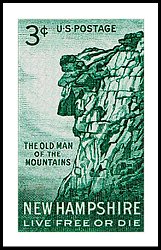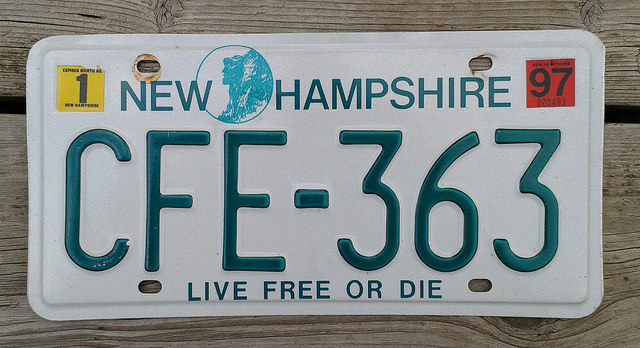New Hampshire Lottery Commission Sues DoJ Over Wire Act Opinion
During his batshit insane ramblings at a press conference this morning, Donald Trump took a moment to welcome William Barr as the new Attorney General of the United States and wish him luck. Barr’s first official day in the country’s highest law enforcement position is off to a rip-roaring start, as he and the Department of Justice have been sued by the New Hampshire Lottery Commission (NHLC), which wants to stop the DoJ from enforcing the new opinion of the Wire Act.
 The new opinion was issued by the Justice Department’s Office of Legal Counsel, saying that the Wire Act makes all interstate online gambling illegal. It is a reversal of the OLC’s interpretation of the Wire Act from late 2011 – then under the Obama administration – when it said that the Wire Act applied only to sports betting, a ruling that makes nothing but perfect sense when you read the text of the Act.
The new opinion was issued by the Justice Department’s Office of Legal Counsel, saying that the Wire Act makes all interstate online gambling illegal. It is a reversal of the OLC’s interpretation of the Wire Act from late 2011 – then under the Obama administration – when it said that the Wire Act applied only to sports betting, a ruling that makes nothing but perfect sense when you read the text of the Act.
Anyone with half a functioning brain and even a modicum of intellectual honesty knows the OLC’s November Wire Act opinion was a crock of shit and it has been roundly criticized already. In addition to New Hampshire, New Jersey has threatened to sue.
New Hampshire may seem like an odd state to be the first from whence a lawsuit sprouted, as it has no online poker or online casino gaming, but it does have internet lottery sales and is looking into sports betting as well. Other states have more riding on online gambling, though. The important thing about New Hampshire is that it, along with Maine, Massachusetts, Puerto Rico, and Rhode Island, falls under the jurisdiction of the United States Court of Appeals for the First Circuit. It is that Court of Appeals that had previously ruled – during the period of Wire Act interpretation prior to 2011 – that the Wire Act applies only to sports betting. New Hampshire and online gambling proponents are hoping for “home court” advantage, so to speak.
In the introduction, the New Hampshire Lottery lays out a few bullet points summarizing its arguments (I have summarized said bullet points even further and these are not the only ones in the intro):
• Such a construction of the statute is not faithful to the text, structure, purpose, or legislative history of the Wire Act.
• Such a construction would also render the statute unconstitutionally vague, as well as unconstitutional under the First Amendment.
• The 2018 Opinion’s interpretation of the Wire Act also intrudes upon the sovereign interests of the State of New Hampshire without unmistakably clear language demonstrating that Congress intended such a result.
Later in the lawsuit, the NLHC gets into what the consequences of the new Wire Act opinion may be. It says that it has been using interstate communications for decades to operate multi-jurisdictional lottery games (read: Powerball and Mega Millions) and that “all of its lottery-related activities use the Internet or wires incidentally.”
And then…Here. We. Go. (emphasis mine)
93. More specifically, the broadest interpretation of the 2018 Opinion could result in the suspension of all NHLC sales, resulting in an immediate annual loss of over $90 million to the State, as well as additional expenses to try to comply with the 2018 Opinion.
94. To the extent the NHLC cannot utilize Internet communications in any of its operations, sales would likely be reduced to approximately 25% of their current level.
95. Less severe interpretations of the USDOJ opinion may still require suspension of multi-jurisdictional games and compacts that have operated with great success for the nation’s lotteries since the 1980’s. The sharing of bet information and money from wagers across state lines is essential to the operation of these games. Such an action would deprive New Hampshire of approximately $80 million in annual revenue and $40 million in education funding.
96. To the extent the 2018 Opinion seeks only to enjoin the sale of lottery tickets directly over the internet, this action would be inconsistent with the prior actions of the New Hampshire Legislature, the United States Congress, federal court decisional law, and the prior opinion of the Department of Justice. The NHLC relied on each of these legal authorities in launching an iLottery platform.
97. The USDOJ’s reversal of the 2011 Opinion, without any further action or explanation, is also likely to have a chilling effect on banks accepting and processing these lottery-related transactions, which can effectively shut down this sales channel. This would result in a loss of approximately $6-8 million in education funding for New Hampshire.
The New Hampshire Lottery Commission is seeking “declaratory and injunctive relief” against the Department of Justice and Attorney General William Barr.



















COMMENTS